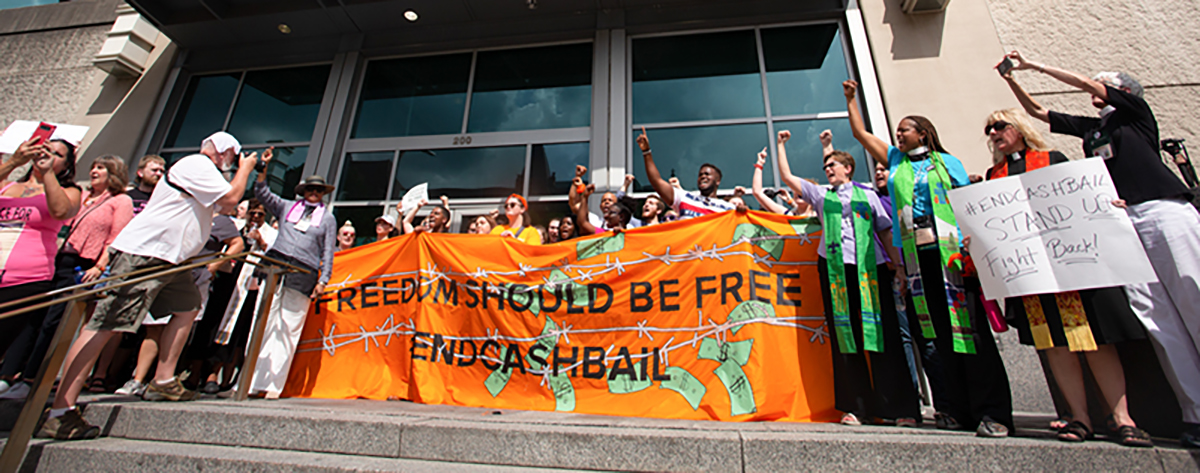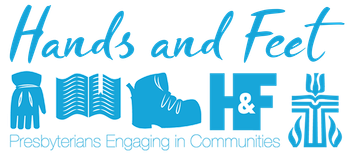
The Public Witness event on June 19, 2018 during the 223rd General Assembly of the Presbyterian Church (USA) - Photo by Michael Whitman
Those were the words emblazoned on the huge banner in front of the marchers. What were hundreds of respectable Presbyterian commissioners to their national General Assembly meeting in St. Louis thinking as they marched a mile in 90 degree heat to the City Justice Center on June 19 to protest the injustice of the cash bail system?
And shouldn’t they have contributed the $54,000 raised at the opening worship service and online to church work instead of using it to bail out prisoners prescreened for release? According to them, what they did was social, racial, and economic justice work, and that is church work. Here is why.
Readers of the Advocate Messenger have been alerted in several forms to an issue that is receiving local attention in the current jail study and also national attention by several social justice advocacy organizations. The debate surrounds the continued incarceration of people for non-violent offenses prior to trial because they cannot make bail, whether it is $1,000 or even $100. They may remain for weeks or months while supposedly presumed innocent.
Let’s paint the big picture. Pretrial detention is a key contributor to the ballooning incarcerated population over the last fifteen years. It accounts for 99 percent of jail growth. Every day an average of 700,000 people are condemned to local jails and separated from their families. About 62 percent of those in jail are not serving time; they are simply awaiting trial for what is typically a non-violent misdemeanor.
In at least one county, a third of the jailed are there for traffic violations. A majority of those in pretrial detention are there because they cannot make bail, and bail therefore becomes a punishment and a method of coercion to plead guilty. Poverty becomes criminalized in a new form of debtors’ prison.
Those detained before trial are four times more likely to receive a jail sentence than those out on bail, and their average jail sentences are three times longer. Those detained are also much more likely to be rearrested after their lives have been destabilized by a jail stay. They may lose jobs, housing, and even children. They may have been unable to pay rent or car payments or child support or providers of child care. They may finally resort to criminal activity simply to recover financially.
In sum, bail hits poor people especially hard. And then there is race. Black people are twice as likely to be arrested (though not twice as likely to commit crimes) and twice as likely to be jailed before trial. LBGTQ and other gender nonconforming family members are arrested and jailed at an even more alarming rate and are more likely to be sexually and physically abused while incarcerated.

Against this background, the Presbyterian Church (U.S.A.)’s Committee on the Office of the General Assembly (of which our minister daughter —the Rev. Marcia Mount Shoop — has been an elected member for several years) developed plans for the St. Louis meeting. These assemblies, composed of around 540 lay and clergy commissioners from across the country, occur every two years at different locations. The Stated Clerk (chief ecclesiastical officer) of the denomination, the Rev. J. Herbert Nelson, II, promoted putting his “Hands and Feet” initiative to work at the Assembly. This initiative seeks to highlight and strengthen local and national initiatives to facilitate change and communicate the love of God.
Nelson and the committee did not want the meeting of the GA to be yet another organizational convention that gathers and spends money in a host city and leaves without any engagement with the local community and its challenges. It was crucial for them to support organizing and advocacy work that was already going on locally, not just to hand down directives from on high.
In this case, Giddings-Lovejoy Presbytery, the regional grouping of congregations located in and around St. Louis, had been engaged for three years in supporting a moral and political project to pay bail in the circumstances just described and to partner with other local groups (such as the St. Louis Action Council, Beyond Cash Bail STL, the Bail Project, Arch City Defenders, De-carcerate STL, and Faith for Justice) and national groups in this endeavor.
The rationale was the announcement of Jesus in Nazareth (quoting Isaiah) that he had come “to bring good news to the poor . . . to proclaim release to the captives and recovery of sight to the blind, to let the oppressed go free” (Luke 4:18).
The planning committee, the local presbytery, and the commissioners to the General Assembly bought in — and in a big way. They believed that bail relief/reform was indeed justice work and church business.
There were probably Presbyterians at the General Assembly and back at home who did not buy in, but their church as a whole took a stand. There are no doubt other Christians from other denominations who are viewing askance what happened in St. Louis. They might say that church work should be about saving souls, and that taking to the streets should focus on calling sinners to repent.
Some Christian objectors might follow the lead of Glen Beck, conservative political commentator, radio host, and television producer. He has attacked Christian congregations’ websites and Christian journals (such a Sojourners: Faith in Action for Social Justice) that announce social and economic justice as part of their mission. He calls these justice labels “code words for communism and Nazism.”
By taking the stand that they took, the Presbyterians gathered in St. Louis demonstrated that they would support a rejoinder to Glen Beck by Bread for the World, a non-partisan Christian citizens movement that works for the alleviation of hunger in our nation and the world: “Economic and social justice are central to the gospel of Jesus Christ.”
For them, justice work IS church work.
